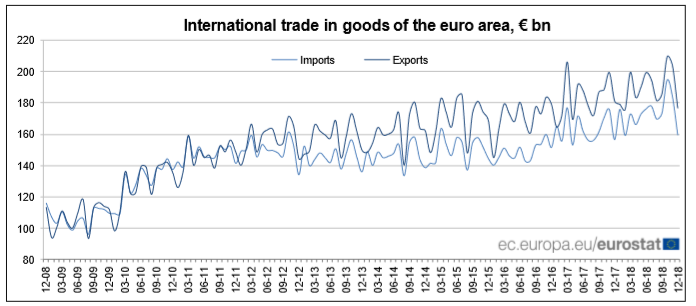Leonid Bershidsky, (2019), “Η μεγαλύτερη οικονομία της Ευρώπης έχει παγιδευτεί”, Bloomberg Opinion στο Capital.gr, 18 Φεβρουαρίου Ο μηδενικός ρυθμός αύξησης της Γερμανίας τους τελευταίους τρεις μήνες του 2018 αντικατοπτρίζει την περίεργη κατάσταση εγκλωβισμού της οικονομίας: είναι υγιής, παραγωγική και έχει περιθώριο επέκτασης, αλλά είναι επίσης ευάλωτη σε ξαφνικούς κραδασμούς -και δεν αποκλείεται να να καταγραφεί πληθώρα τέτοιων φέτος, ιδίως στο εμπόριο. Σχετικές Αναρτήσεις Hanno Degner and Dirk Leuffen, (2018), «Franco-German …Read More
Euro area international trade in goods surplus €17.0 bn
Eurostat/Euro area international trade in goods surplus €17.0 bn/15 Φεβρουαρίου 2019 The first estimate for euro area (EA19) exports of goods to the rest of the world in December 2018 was €176.5 billion, a decrease of 2.5% compared with December 2017 (€181.0 bn). Imports from the rest of the world stood at €159.5 bn, a rise of 1.9% compared with December 2017 (€156.5 bn). As a result, the euro area …Read More
A Very Greek Brexit?
George Papaconstantinou, (2019) “A Very Greek Brexit?”, Project Syndicate, 14 Φεβρουαρίου Unlike the United Kingdom, Greece is one of the European Union’s smaller economies, notorious for its weak institutions and economy, and a net recipient of EU funds. And yet the Grexit near-exit from the EU in 2015 offers important lessons for the final stage of Brexit negotiations. Σχετικές Αναρτήσεις Guntram B. Wolff, (2019), «The implications of no-deal Brexit: is …Read More
Παράθυρο από την ΕΚΤ για μέτρα στήριξης της οικονομίας
Έφη Τριήρη, Γιάννης Παγκαλιάς, (2019) “Παράθυρο από την ΕΚΤ για μέτρα στήριξης της οικονομίας”, Ναυτεμπορική, 16 Φεβρουαρίου Ανοικτή φαίνεται να είναι η πόρτα από την ΕΚΤ για λήψη ενισχυτικών μέτρων για την οικονομία της Ευρωζώνης, που παλεύει να κρατηθεί σε αναπτυξιακούς ρυθμούς, καθώς στις σχετικές δηλώσεις διαμορφωτών νομισματικής πολιτικής έρχεται να προστεθεί και ο οίκος Fitch, ο οποίος κάνει λόγο ακόμη και για νέο πρόγραμμα ποσοτικής χαλάρωσης. Την ίδια ώρα …Read More
The euro’s global dreams and nightmares
Barry Eichegreen, (2019), “The euro’s global dreams and nightmares”, CEPS, 8 Ιανουαρίου One motive for founding the euro was to create a European unit that might provide an alternative to the dollar as an international and reserve currency. The Werner Report, the first full-throated argument for a single European currency, was issued in a period of angst about the Bretton Woods System and the dollar (Zimmermann, 2002). The Delors Report, …Read More
Labour mobility and adjustment to shocks in the euro area: The role of immigrants
Gaetano Basso, Francesco D’Amuri, Giovanni Peri, (2019), “Labour mobility and adjustment to shocks in the euro area: The role of immigrants”, 13 Φεβρουαρίου, VoxEU The response of labour supply to negative shocks is different across regions due to varying levels of labour mobility. This column shows that the elasticity of labour supply in response to economic shocks is lower in the euro area than in the US, suggesting that a …Read More
A European employment guideline—a new recipe for dealing with the crisis
Beat Baumann, Joachim Ehrismann and Cris Bucheli, (2019), “A European employment guideline—a new recipe for dealing with the crisis”, 7 Φεβρουαρίου, Social Europe Full employment could become a new target for an insecure Europe. A European employment guideline would provide the means to hit it. Σχετικές Αναρτήσεις Branko Milanovic, (2018), «Migration Into Europe: A Long-Term Solution?», Social Europe, 19 Νοεμβρίου Giang Ho and Rima Turk-Ariss, (2018), «The Labor Market Integration …Read More
Whose (fiscal) debt is it anyway?
Maria Demertzis, David Pichler, (2019), “Whose (fiscal) debt is it anyway?”, 6 Φεβρουαρίου, Bruegel The authors map how much fiscal debt is in the hands of domestic and foreign holders in the euro area. While the market for debt was much more international prior to the crisis, this trend has since been reversed. At the same time, central banks have become important holders of fiscal debt. Σχετικές Αναρτήσεις European Commission, …Read More
Official lending in the euro area: Lessons for debt sustainability
Giancarlo Corsetti, Aitor Erce, Timothy Uy, (2019), “Official lending in the euro area: Lessons for debt sustainability “, 13 Φεβρουαρίου, VoxEU During the euro area crisis, management of official loan maturities emerged as a critical item in the discussion on which instruments and strategies are most effective at ensuring debt sustainability. Using a theoretical model calibrated to Portugal and cross-country data, this column shows that lengthening loan maturities and managing …Read More
GDP up by 0.2% and employment up by 0.3% in the euro area
Eurostat/GDP up by 0.2% and employment up by 0.3% in the euro area/14 Φεβρουαρίου Seasonally adjusted GDP rose by 0.2% in both the euro area (EA19) and the EU28 during the fourth quarter of 2018, compared with the previous quarter, according to a flash estimate published by Eurostat, the statistical office of the European Union. In the third quarter of 2018, GDP had grown by 0.2% in the euro area …Read More






